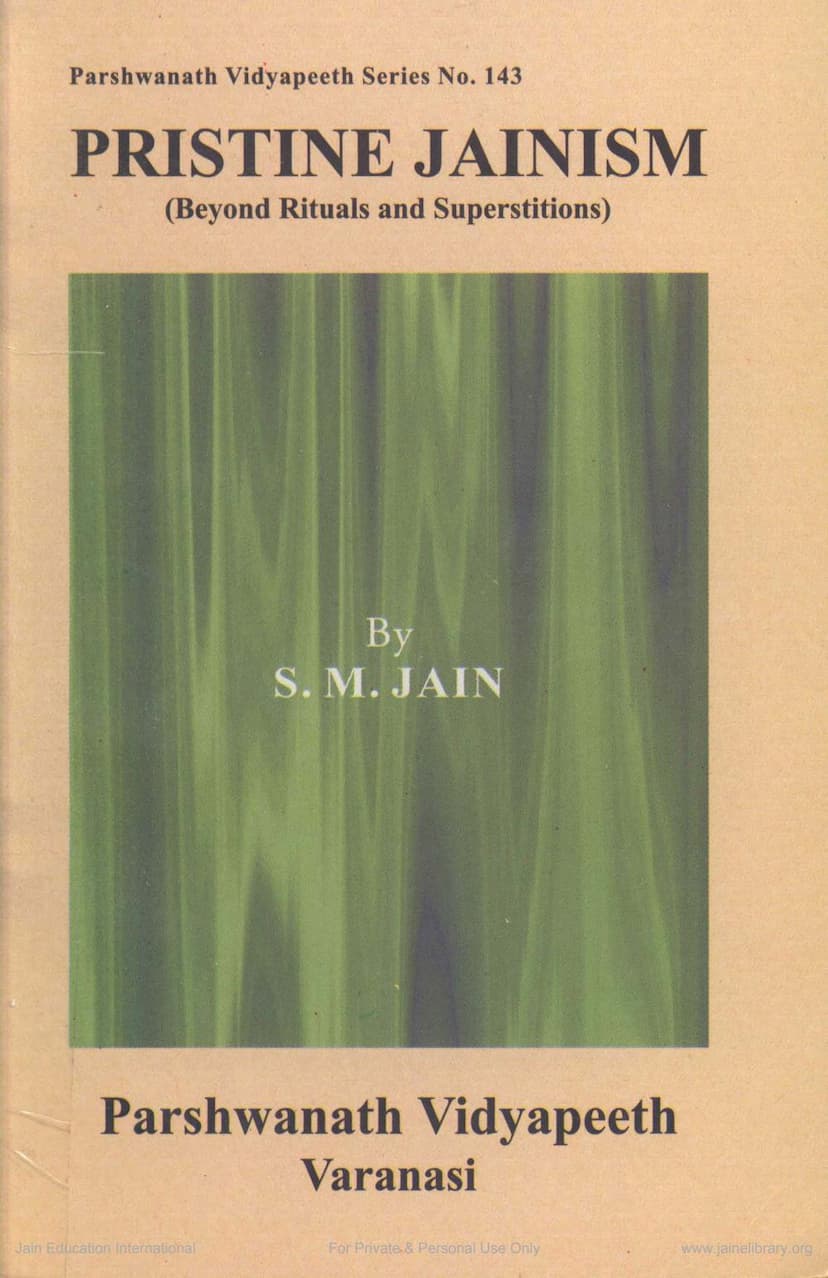Pristine Jainism
Added to library: September 2, 2025

Summary
"Pristine Jainism (Beyond Rituals and Superstitions)" by S.M. Jain, published by Parshwanath Vidyapeeth, Varanasi, is a comprehensive exploration of Jainism that emphasizes its rational and scientific underpinnings. The author argues that the core teachings of Jainism, as practiced by liberated souls (Arhats and Tirthankaras), have been overshadowed by rituals, superstitions, and ostentatious displays of wealth in the name of devotion (Bhakti).
The book critiques the current state of Jainism, where many followers are perceived to have deviated from the fundamental principles. Jainism, according to the author, is based on rationality (Samyaktva), the principle of cause and effect (Karma Siddhanta), and the interdependence of all life forms (Symbiosis). These principles are presented as rational and scientific, contrasting with superstitious beliefs and practices.
Key themes and arguments presented in the book include:
- Rationality (Samyaktva) as the Core: The book strongly advocates for rationality in belief, thought, and action as the cornerstone of Jainism. It argues that superstitious beliefs, rituals, and the seeking of worldly benefits from deities are contrary to the fundamental tenets of Jainism.
- Critique of Ritualism and Superstition: S.M. Jain contends that many rituals, such as elaborate worship ceremonies, idol decorations, and certain devotional practices, are either imitations of other religions or distortions of Jain principles. These are seen as detrimental to the true understanding and practice of Jainism, leading to a decline in moral standards and the erosion of the community's identity.
- Symbiotic Aspects of Jainism: The book highlights the principle of symbiosis, or mutualism, as a central tenet that underlies the Jain worldview. This principle emphasizes the interdependence and mutual benefit among all living beings and the environment. The author contrasts this with predation and exploitation, which lead to conflict and suffering.
- Kalpavṛkṣas (Forests) in Jainism: The author reinterprets the concept of Kalpavṛkṣas (wish-fulfilling trees) not as mythological entities but as representations of rich, diverse forests that sustainably cater to human needs. He connects the preservation of forests with the concept of a happy and harmonious life, advocating for an agro-forestry model as a return to pristine Jain practices.
- Cyclic Changes, Not Creation: Jainism, as presented in the book, rejects the concept of a creator God. Instead, it explains the universe through the concept of cyclic changes (ascending and descending eras), driven by natural laws and the collective actions of beings. This perspective aligns with scientific evolutionary models.
- Code of Conduct: The book details the elaborate code of conduct prescribed in Jainism for both ascetics and laypeople. It emphasizes the importance of the five great vows (Ahimsa, Satya, Asteya, Brahmacharya, Aparigraha) and the practice of emotional discipline. The author highlights that the meticulous rules are designed to minimize harm and promote a rational, symbiotic lifestyle.
- Flaws in Scriptures and Practices: S.M. Jain points out discrepancies and contradictions in Jain scriptures, attributing them to the influence of other religious traditions and the limitations of human authors. He calls for a critical examination and revision of certain passages to align them with Jain principles.
- Importance of Personal Effort (Puruṣārtha): The book repeatedly stresses that salvation and spiritual progress depend on individual effort (Puruṣārtha) and adherence to the rational path, rather than relying on external forces or rituals.
- Need for Reform: The author concludes by urging Jains to return to the pristine form of their religion, emphasizing rationality, ethical conduct, and the symbiotic relationship with nature. He suggests that this can lead to the restoration of Jainism's past glory and contribute to universal peace and happiness.
In essence, "Pristine Jainism" is a call to action for the Jain community to rediscover and re-embrace the rational, ethical, and environmentally conscious core of their faith, moving beyond superficial rituals and superstitions.